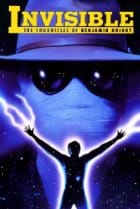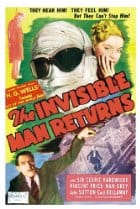---------------------------------------------------
Herbert slipped the ring of Gyges on to his finger and was immediately startled by what he saw: nothing. He had become invisible.
For the first few hours, he wandered around testing his new invisibility. Once, he accidentally coughed and found that in the ears of the world, he was silent too. But he had physical bulk, and would leave an impression on a soft cushion or create an unexplained obstacle for those seeking to walk through him.
Once he became used to what it was like to live invisibly, Herbert started to think about what he could do next. To his shame, the ideas that popped into his head first were not entirely savoury. He could, for instance, loiter in the women's showers or changing rooms. He could quite easily steal. He could also trip up the obnoxious suits who shouted into their mobile phones.
But he wanted to resist such base temptations and so tried to think of what good deeds he could do. The opportunities here, however, were less obvious. And for how long could he resist the temptation to take advantage of his invisibility in less edifying ways? All it would take would be one moment of weakness and there he'd be: peeking at naked women or stealing money. Did he have the strength to resist?
Source: Book two of The Republic by Plato, 360 BCE.
Baggini, J., The Pig That Wants to Be Eaten, 2005, p. 223.
---------------------------------------------------
In the original text, during an exploration into the concept of justice, Plato thought it was absurd that we would have the strength to resist the temptations of the power of invisibility. In Plato's version, a shepherd named Gyges finds a gold ring that makes him invisible, whereupon...:
"...he contrived to be chosen one of the messengers who were sent to the court; where as soon as he arrived he seduced the queen, and with her help conspired against the king and slew him, and took the kingdom. Suppose now that there were two such magic rings, and the just put on one of them and the unjust the other; no man can be imagined to be of such an iron nature that he would stand fast in justice. No man would keep his hands off what was not his own when he could safely take what he liked out of the market, or go into houses and lie with anyone at his pleasure, or kill or release from prison whom he would, and in all respects be like a God among men. Then the actions of the just would be as the actions of the unjust; they would both come at last to the same point. And this we may truly affirm to be a great proof that a man is just, not willingly or because he thinks that justice is any good to him individually, but of necessity, for wherever any one thinks that he can safely be unjust, there he is unjust. For all men believe in their hearts that injustice is far more profitable to the individual than justice, and he who argues as I have been supposing, will say that they are right. If you could imagine any one obtaining this power of becoming invisible, and never doing any wrong or touching what was another's, he would be thought by the lookers-on to be a most wretched idiot, although they would praise him to one another's faces, and keep up appearances with one another from a fear that they too might suffer injustice. Enough of this."
Anyone who has read or heard of Raskolnikov's inner turmoil in Crime and Punishment knows that this isn't entirely correct. It is hard to imagine owning Gyges' ring and never using it for unjust purposes, but crimes do fill people with guilt over their past actions, as well as dread about those actions being discovered in the future. Wouldn't the owner of such a ring of invisibility worry about being blamed for any unsolved crimes if the power they possessed ever came to light? Of course they would. To think people would automatically and continually commit crimes just because they could is based on a flawed belief that human's are inherently selfish and evil. Even though no one (we know of) has been given the gift/curse of invisibility, there are already countless examples of people acting well even though they were certain that no one was or could be watching them. We do so because we have deeply embedded evolutionary reasons to find such actions rewarding.
On this week's Psychology Podcast with Dr. Scott Barry Kauffman, the host discussed scientific findings with his guest—Dr. Dacher Keltner, the author of Born to Be Good and The Power Paradox--which delved into these evolutionary reasons. I particularly enjoyed this part of the interview from about 21:30 to 28:00:
SBK: You brought up guilt, and there seems to be a link between guilt and prosociality. Is that right?
DK: Yeah, there is.
SBK: Why? Why is there a link there?
DK: When you have done things to make you feel guilt, typically you've harmed someone else, or maybe there's harm in the world that you've created and your reputation is jeopardized. And so given that, guiit, studies show, tends to make you more prosocial, more altruistic. Studies find that if I tend to be a little bit prone to guilt, I'm a better leader, because I'm kind of worried about hurting other people's feelings and as a result I do things that are better for leadership so it's a really undervalued emotion in our culture.
SBK: Well, you know, that's really interesting because you study power as well right?.
DK: Yeah, and that's my more recent book, The Power Paradox, where you get power by advancing the welfare of others, sharing resources, expressing gratitude. But then with power, once we feel above people, we feel privileged, or we feel invincible...we act like jerks. And that's why — I think this was in the footnotes to The Power Paradox — guilt is a really important emotion to be looking for in leaders. Are they going to correct themselves if they make mistakes? Are they going to figure out ways to make amends for any damages they've caused? So it's a counterintuitively important emotion for effective power.
SBK: Super interesting. Although there are certainly cases where a lot of people who were jerks in power were jerks when they were born. Right?
DK: Yeah, but I think those are less typical than you might imagine. I think the more common trajectory is that we start out being more interested in other people, and power kind of brings out the bad in human nature. Even when you study Joseph Stalin, it really was power that turned him into a madman. A lot of historians, when they look at Hitler's early life, he was just kind of an awkward weird person with artistic sensitivities and sensibilities, but power turned him into one of the world's worst madmen. So I think that's more common.
SBK: Okay. I want to believe that. Apparently, you do a Trump impersonation. Is that right?
DK: (Laughs) Yes. But actually, this leads to a scientific finding that's important so... In my new book I write about how everybody thinks that people rise in power by being Machiavellian and narcissistic, but the data don't line up with that thinking. Instead, what the data show is that once I have power, I become narcissistic and Machiavellian. My colleague and I just published a paper in Psychological Science to really test this for the first time in a very direct way. We looked at U.S. senators and we coded their non-verbal behavior for narcissistic tendencies or courageous humane tendencies, i.e. if you show caring for other people. We found that the courageous senators, defined by their non-verbal behavior, got more support for the bills they were trying to get passed. The narcissistic Machiavellian senators got less support, so that strategy cost them. And here comes the Trump impersonation. One of the key non-verbal expressions of narcissism looks like this...(does a great Trump impersonation)
SBK: (Laughs) But my guests can't see that! Wait, do that again and I'll put a screen capture up in my podcast notes. ... Okay good, I got it.
DK: (Laughs) And what is good about what the science shows for those narcissistic Machiavellian politicians in the senate is that...no one likes them! No one wanted to support their bills. They weren't influential. So, thats another reason to be skeptical of the Trump candidacy.
SBK: That's great. So you know I love digging into a Maslow point of view and he talked about "esteem needs," and I would put power in that class of esteem needs. And it's important. As you're saying, this is like a fundamental human need and when we get addicted to satisfying that need, or when we get it too much, then that can actually turn us into a-holes.
DK: Yeah. What the new neuroscience is showing is that a lot of our social needs are on par with sleeping and nearly as powerful as eating. One of these—caring for others—is so striking. Compassion activates old regions of the brain so it's old evolutionarily. And another [social need] is status. William James said there's no deeper craving that we have than to have the appreciation of other people. And there's amazing work by Keely Muscatel showing we hunger for the respect of other people. She shows that if I hear kind words about my reputation from a friend, it activates these safety networks in the brain, which are activated when we feel safe physically. It tells us that social safety and inclusion is on par with physical safety, and that drives us, like you were very aptly saying, to go after attention and respect and power. But then the trouble is that once we feel power we lose sight of the very things that got us the status and respect of others in the first place.
SBK: I love that.
And I love that too. I often write about the need to find balance between the fundamental decisions to compete or cooperate with others. Navigating the power paradox looks to me like it walks the razor's edge between those two choices too, as part of a broader, universal set of tradeoffs that we must discover how to make. As I wrote in my published paper on morality:
Our intuitive moral feelings are often in conflict because of the debates that rage within us regarding the self vs. society, or society vs. the environment, or the short-term vs. the long-term, or just the fundamental choices between competition and cooperation. This is what drives the two faces of humankind. We are neither inherently good nor inherently evil – we are capable of both, a flexibility we must have in order to have the power to choose between alternate paths that are right some of the time and wrong some of the time. ... It’s only recently that we’ve discovered this (recent in comparison to the field of philosophy anyway), but research in fields such as game theory, evolutionary biology, animal behavior, and neuroscience has shown us that humans and other animals have natural dispositions to act for the common good of their kin, social group, species, and ecosystems, and even over evolutionary timeframes. Under certain circumstances, organisms will be social, cooperative, and even altruistic. Using terms such as kin altruism, coordination, reciprocity, and conflict resolution, evolutionary theory has explained why and how some organisms care for their offspring and their wider families, aggregate in herds, work in teams, practice a division of labor, communicate, share food, trade favors, build alliances, punish cheats, exact revenge, settle disputes peacefully, provide altruistic displays of status, and respect property. All of these behaviors clearly lead to prolonged survival for the groups of individuals that exhibit them.
So what does all this have to say about invisibility? In The Power Paradox, Dr. Keltner indicated that we readily cooperate with others until we feel powerful enough to outcompete them. This is a modern confirmation of Lord Acton's quote that "power tends to corrupt, and absolute power corrupts absolutely." While this is true for the Hitlers and Stalins of the world, it was not true, however, for Lincoln, Gandhi, Mandela, or countless others who obtained smaller powers over smaller groups of people. The positive feelings we receive from actions that give us social safety (remember how most tyrants die) can lead us to value such honorable actions even when we might be tempted to think we are beyond such needs. Wise people can see this and act accordingly...whether it is invisible to us or not.





